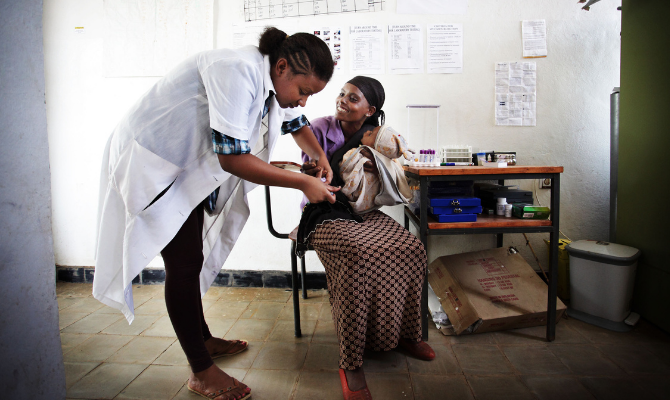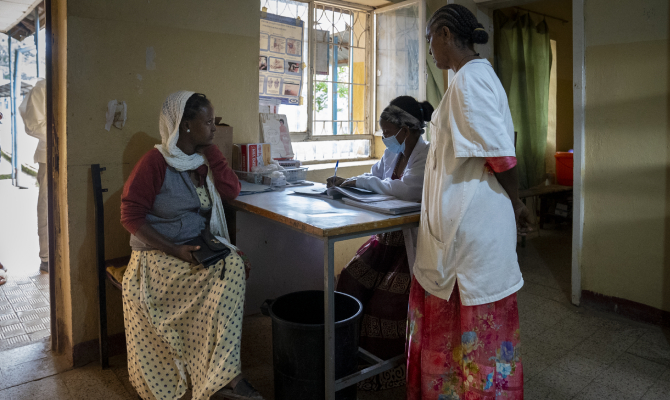The final event of the project “Improving the quality of care and prevention of diabetes mellitus and hypertension”, financed by the World Diabetes Foundation (WDF), and implemented by Doctors with Africa CUAMM in collaboration with the Ministry of Health and the Ethiopian Diabetes Association (EDA), was held today in Addis Ababa.
A precious opportunity to share the results of over three years of intervention that has promoted prevention and treatment activities, at all levels, of Non Communicable Diseases (NCDs), and to present regional and national strategies in the field of NCDs.
14,455 people were tested for diabetes and 17,098 for hypertension; 22,470 patients were treated in the healthcare facilities supported by the project and 392,355 people were reached through awareness-raising activities. Moreover, 505 health workers were trained on NCDs, and 105 supervisions were carried out in health facilities.
“It was a successful intervention thanks to the valuable collaboration of all partners. WDF and CUAMM act with the same philosophy, for the same goal: accompanying countries in strengthening national strategies in the field of NCDs, supporting Ministries of Health, local health authorities, and hospitals,” said Bent Lautrup-Nielsen, Head of WDF’s Global Development and Advocacy Department.
NCDs – cardiovascular disease, cancer, chronic respiratory disease and diabetes – are estimated to account for 46% of all deaths in Ethiopia. The latest WHO data show that almost one in five Ethiopians (18.3%) is at risk of dying before the age of 70 from one of the four major NCDs. In particular, Ethiopia has over 1.7 million people with diabetes, making it one of the four countries in Africa with the highest number of patients with diabetes mellitus.
The project therefore aimed to improve the quality of care and prevention services in 15 hospitals and 45 health centres in the regions of Oromia, Amhara, SNNP, Tigray and Gambella, and in the city of Addis. Technical support was provided to the Ministry of Health to facilitate the expansion of NCDs services in Primary Health Care Units. In addition, information and awareness-raising activities were promoted to increase community awareness of NCDs.
“There is better community awareness about the prevention and treatment of diabetes and hypertension thanks to the community mobilisation campaigns promoted by the project,” says Addisu Worku, Cuamm coordinator of the NCDs prevention and control team. The skills and motivation of health workers have also improved thanks to the training courses held over the years. In addition, health centres can now provide screening and treatment services for NCDs, unlike before when people had to travel very long distances to reach hospitals”.
“There have been clear improvements in access to services for NCDs, but also in the collection, recording and management of quality data,” added Tsehay Ayele, NCD coordinator for the SNNP Regional Health Bureau. All this has been made possible by the emphasis on training and capacity building activities for health workers”.
“In the last years CUAMM has focused projects on NCDs in different countries such as Angola, Mozambique, Sierra Leone, Tanzania, and Ethiopia – says Laura Nollino, endocrinologist and technical advisor on NCDs for CUAMM -. CUAMM has developed and extensive intervention programme on NCDs, also thanks to the support of WDF among others, preferring an integrated approach. It aims to strengthen diabetes control, as well as the improvement of prevention, early diagnosis and management of the disease by also promoting an active involvement of the community. Finally, a key point for CUAMM is the training of health workers on NCDs from the HCs to the central hospitals. As we’ve learned from the field experience, it’s better to start slowly with small initiatives and expand then to programmes on a national scale. No patients should be left behind”.
A commitment that continues and is consolidated also with the new project on the way on type 1 diabetes. Not just a point of arrival, therefore, but a new start to improve prevention and treatment, fostering a change of approach to NCDs.
Photo by Andrea Frazzetta





